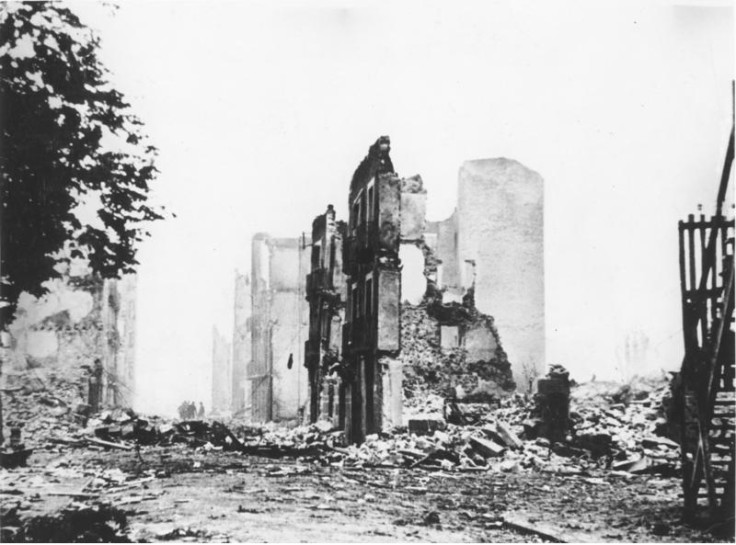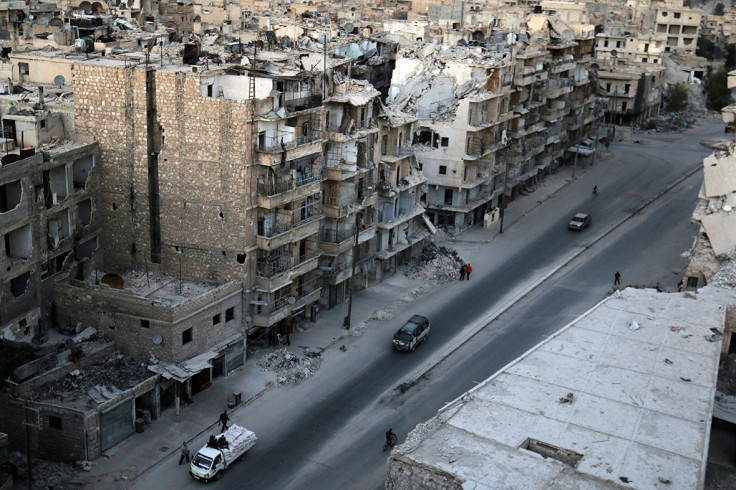Is Aleppo our Guernica? How Spanish town became a symbol of the brutality of war
Parallels have been drawn between the Nazi bombing of Guernica and the Russian air strikes on Aleppo.

On 26 April, 1937, during the Spanish Civil War, the Basque town of Guernica was bombed for three hours by Hitler's Luftwaffe and Italian fascist planes, leaving more than 250 civilians dead.
The episode has become synonymous with the brutality of war, after being depicted in Pablo Picasso's eponymous masterpiece.
Now former International Development Secretary Andrew Mitchell has claimed there is a second Guernica unfolding in the Syrian city of Aleppo, where thousands of civilians have been killed by the Russian military acting in support of the regime of Syrian President Bashar al-Assad.
In comments made before a parliamentary debate on the humanitarian catastrophe in Aleppo, Mitchell compared the actions of the Russians to that of the Nazis responsible for Guernica.
"When it comes to incendiary weapons and munitions such as bunker buster bombs and cluster bombs, the UN makes it clear that the systematic use of such indiscriminate weapons in densely populated areas amounts to a war crime," Mitchell told parliament late on Monday.
"We are witnessing events that match the behaviour of the Nazi regime in Guernica in Spain."
A symbol of the brutality of war
The Guernica attack was the first time a military air force deliberately targeted civilians.
The Basque region was fiercely resistant to the fascist forces of Spanish dictator Francisco Franco, who wanted to terrorise the population into submission with the help of his German and Italian allies.
Eyewitness Noel Monks, a correspondent for London's Daily Express, described the devastation caused in the Spanish town, after waves of attacks by German and Italian bombers.
"...I was the first correspondent to reach Guernica, and was immediately pressed into service by some Basque soldiers collecting charred bodies that the flames had passed over. Some of the soldiers were sobbing like children. There were flames and smoke and grit, and the smell of burning human flesh was nauseating. Houses were collapsing into the inferno.
"In the plaza, surrounded almost by a wall of fire, were about a hundred refugees. They were wailing and weeping and rocking to and fro. One middle-aged man spoke English. He told me: 'At four, before the market closed, many aeroplanes came. They dropped bombs. Some came low and shot bullets into the streets. Father Aroriategui was wonderful. He prayed with the people in the Plaza while the bombs fell.'.."
No military targets were hit in the attack, with bridges and factories left intact. The only targets were civilians.

Picasso's stark, monochrome painting was only returned to Spain after the death of Franco in 1975, and now hangs in Madrid. A replica hangs as a backdrop in the UN debating chamber in New York, a reminder of the potential consequences of decisions made by leaders who gather there.
The attack became a symbol of the new brutality of war, with the attack a dress rehearsal for Nazi Germany's blitzkrieg attacks on cities across Europe during the Second World War and subsequent Allied attacks on civilian targets.
Parallels with Aleppo
Aleppo was once Syria's biggest city and its industrial and financial centre.
However, much now lies in ruins after four years of brutal combat between rival rebel groups and Syrian government forces, backed since 2015 by the Russian military.

As in 1937, innocent civilians have borne the brunt of the violence. According to monitoring organisations thousands of civilians have been killed in Russian attacks on markets, schools, and homes. Amnesty International has accused Russian forces of deliberately targeting hospitals.
Mitchell said that an alleged Russian attack on a UN and Syrian Arab Red Crescent aid convoy in September constitutes a war crime.
Liberal Democrat Foreign Affairs Spokesperson Tom Brake criticised the UK government for not acting to alleviate the situation in Aleppo: "The situation in Aleppo shames the international community and has caused untold damage to the UK government's reputation as a force for good in the world."
Russian President Vladimir Putin today cancelled a scheduled trip to Paris after his French counterpart Francois Hollande suggested Russia should face war crimes charges for bombing civilian targets in Aleppo. At a UN Security Council session in September Russia was accused of using bunker-busting and incendiary bombs on the 275,000 civilians living in the rebel-held east of the city
As Franco denied that Guernica had taken place, preferring instead to blame Communist rebels for the destruction, so propaganda and disinformation has swirled around Aleppo, with the Kremlin denying targeting civilians and blaming rebel groups .
Nearly 80 years after bombs fell on Guernica, the attack continues to serve as a brutal precedent and warning.
© Copyright IBTimes 2025. All rights reserved.






















